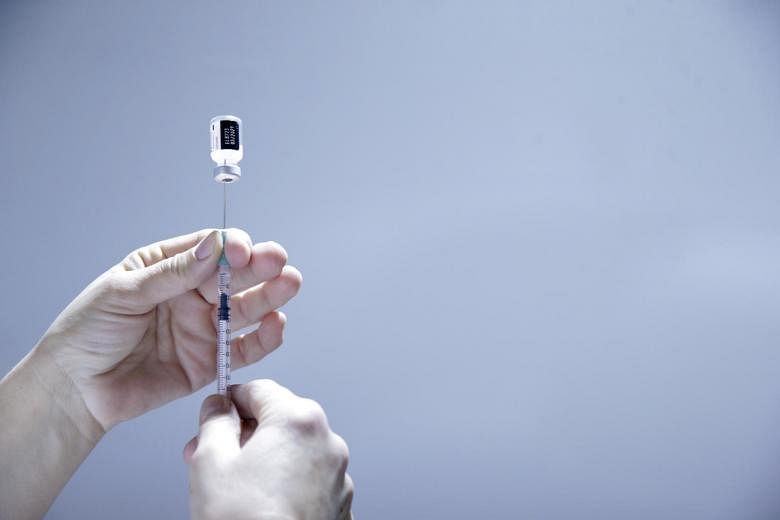BERLIN - With vaccination progress slow in many European countries, people are trying to jump the queue and get the anti-Covid-19 shot abroad.
While critics label such behaviour unethical as there may be others in greater need of the vaccine, some tour operators consider this to be a legitimate option in a market society where supply and demand are the key determinants.
Mr Christian W. Mucha, a publisher of travel and lifestyle magazines in Austria, has made it clear that he believes in free-market values. Anyone who clicks on his website Impfreisen.at is welcomed by this motto: "First come. First go. Freedom for you."
This slogan is embedded in a picture of an idyllic tropical island in a blue sea. The underlying message: While at home you have to deal with conflicting reports about the vaccination process, bureaucracy and a waiting time of months, we are offering the vaccine plus other treats fast, clean and in a relaxing environment.
On signing up with Impfreisen, one has several options - depending on the money one wants to spend.
At "discount" rates, the vaccination trip costs between €3,000 (S$4,800) and €4,000.
The idea is to have a quick return flight to, say, Serbia, to receive a one-dose vaccine.
The US pharmaceutical company Johnson & Johnson offers a vaccine that requires only one injection, and it is soon to be approved in the EU. Most other vaccines available now require two doses injected weeks apart.
Mr Mucha, in an interview with an Austrian newspaper, did not rule out making vaccines from Russia and China also available.
If someone wants to combine the vaccination with plenty of luxury, then the bill can get as high as €20,000 or even more.
Destinations in the Arabian Gulf or in India might be possible, where customers can spend three weeks between two shots. The Austrian company offers exclusive trips to Dubai, with a stay at the Burj Al Arab, a chauffeured limousine service and butler.
In the UK, the concierge service Knightsbridge Circle is offering trips to Dubai - for a whopping £40,000 (S$74,000).
A so-called vaccine holiday includes first-class flights, accommodation and shots of the Pfizer-BioNTech or Sinopharm vaccines.
"It's like we're the pioneers of this new luxury travel vaccine programme. You go for a few weeks to a villa in the sunshine, get your jabs and your certificate and you're ready to go," said Stuart McNeill, founder of Knightsbridge Circle, in an interview with the London Evening Standard.
Knightsbridge charges its clients, comprising "CEOs, entrepreneurs, royalty and celebrities", an annual membership fee of £25,000.
In Germany, where mass vaccinations are unlikely before late spring or early summer, companies have sprung up offering packages combining travel and vaccinations.
However, critics such as Mr Karl Lauterbach of the German Social Democratic Party believe it is an "unethical business model" for travel agencies and tour operators to attract tourists by promising them vaccination.
Any remaining vaccine doses should be made available to other, needier countries that have greater difficulties getting people vaccinated, such critics argue.
All this comes at a time when hundreds of thousands of unused doses of the AstraZeneca vaccine are sitting on the shelves in Europe, mostly in Germany.
The vaccine acquired a bad reputation in Germany and other European countries after the haggling between the British-Swedish company and the European Commission over delivery quantities and dates.
Reports surfaced indicating that the vaccine is not as effective as others, should be given only to people under 65 years of age and has stronger side effects.
Although much of this has been proven wrong, people in Germany are hesitant about getting an AstraZeneca shot.
Vaccines may also be available - illegally - over the darknet, an overlay network within the Internet known for its high level of anonymity. It is reported that the vaccines sell for several thousand dollars per shot there.
Countries that have become a destination for vaccinations have to decide whether they want to allow this kind of business or not.
Israel has declined to serve people from outside as long as its own population is not fully vaccinated, though it may not be too far from achieving that.
In the United States, Florida started vaccinations early, and, at first, no proof of residency there was required. But this has now changed and Florida has banned vaccinations for people from other countries and even other US states.
Canadians were reportedly taking advantage of Florida's liberal policy and travelling there to get a shot. Last week the head of Canada's biggest public pension fund had to resign after news broke that he jumped the line by travelling to the United Arab Emirates to get vaccinated.
Mr Mucha, however, seems to be unfazed by his critics. He is convinced that he has a good reason for offering his vaccination trips.
"Austria and the EU both botched the coronavirus vaccination campaign," he told the German journal Wirtschaftswoche. "The EU has failed to pay a fair market price for vaccines."
Had the European Union been ready to pay more for a dose of the Pfizer-BioNTech vaccine, Austria would have spent €200 million more on 10 million doses.
"That is a negligible amount when just one day of lockdown costs us a billion (euros)," Mr Mucha said.












